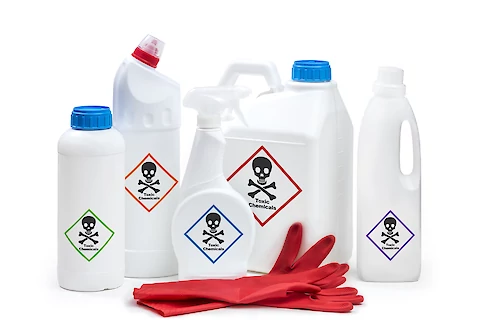
March marks Poison Prevention Awareness Month, an important reminder to senior citizens and their caregivers to stay vigilant when it comes to mitigating the risk of accidental poisoning. At Senior Helpers, we want to help you stay safe by educating you on the potentially poisonous items found in households. While many of these items can be relatively benign when handled safely, it's important for you to know the risks and how to stay safe. Here are six of the most common poisonous items that could hurt seniors.
1. Medications
Taking the wrong medications or too many medications can be incredibly dangerous and even lead to overdose. Despite being labeled as safe, certain medications can interact with each other, leading to hospitalization or worse. For optimal safety, make sure that all medications are properly stored and away from sunlight in their original, labeled containers. It's also important to regularly check the expiration dates and discard unused, expired medications safely.
2. Household Cleaners
When dealing with household cleaners, it's crucial to practice caution. Never mix multiple cleaning products together, as this can lead to hazardous reactions. Common household chemicals (such as bleach and ammonia) should never be mixed together since this combination can produce toxic fumes, leading to permanent respiratory damage. Whenever possible, substitute these harsher chemicals with non-toxic, biodegradable products, such as baking soda and vinegar.
3. Carbon Monoxide Sources
Carbon monoxide is an invisible, odorless gas that can be produced by many household items, such as gas stoves, furnaces, and fireplaces. If inhaled, this gas can cause a variety of symptoms, such as dizziness, nausea, and even death. To prevent accidental poisoning, it's important to install carbon monoxide detectors on all levels of the home. It's also recommended to have an HVAC professional inspect your home's heating systems regularly.
4. Venomous Pests
Some of the most common venomous pests include spiders, scorpions, and ticks. While most of these creatures are relatively harmless if handled properly, they can potentially cause severe reactions in seniors and young children. To reduce the risk of potential health complications, it's important to take measures to prevent infestations and promptly remove venomous pests safely if they are spotted.
5. Alcohol and Medication Interactions
Alcohol and certain medications should never be mixed together as this can cause dangerous side effects and greatly increase the risk of overdose. Common over-the-counter medications, such as ibuprofen, should not be taken with alcohol. Ideally, medications must be taken with a meal and with water.
6. Other Potential Poisons
Lastly, some of the less recognizable items in the home can also be quite poisonous. This includes certain plants and small, coin-sized batteries, which can present a choking hazard and contain corrosive chemicals, respectively. To keep your home safer, it's important to carefully inspect it for any potential hazards and take the necessary steps to identify and remove any potential poisons.
Stay Safe with Senior Helpers
Poison prevention is a serious issue amongst seniors, and requires proactive efforts to ensure their safety. Senior Helpers Ann Arbor is dedicated to helping seniors in Adrian, Ann Arbor, Ypsilanti, Jackson, Dexter, and Hillsdale stay safe by educating them on the potential dangers found in many households. We recommend that seniors and their caregivers alike stay vigilant and take the steps to properly identify and remove potential poisons. For more resources, contact us today!